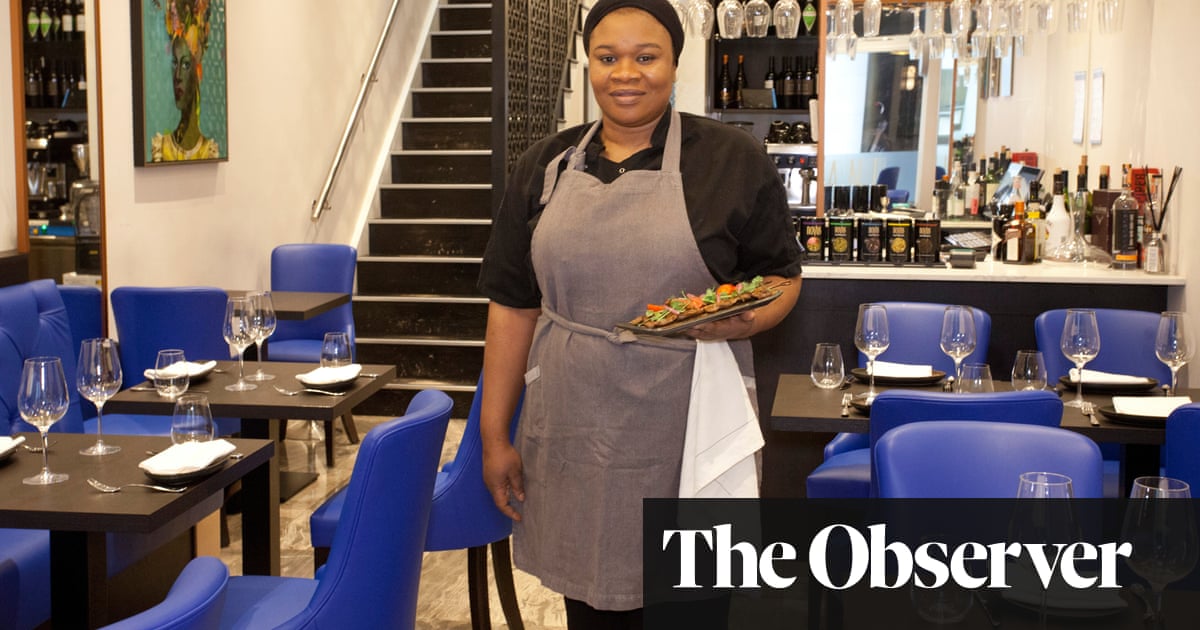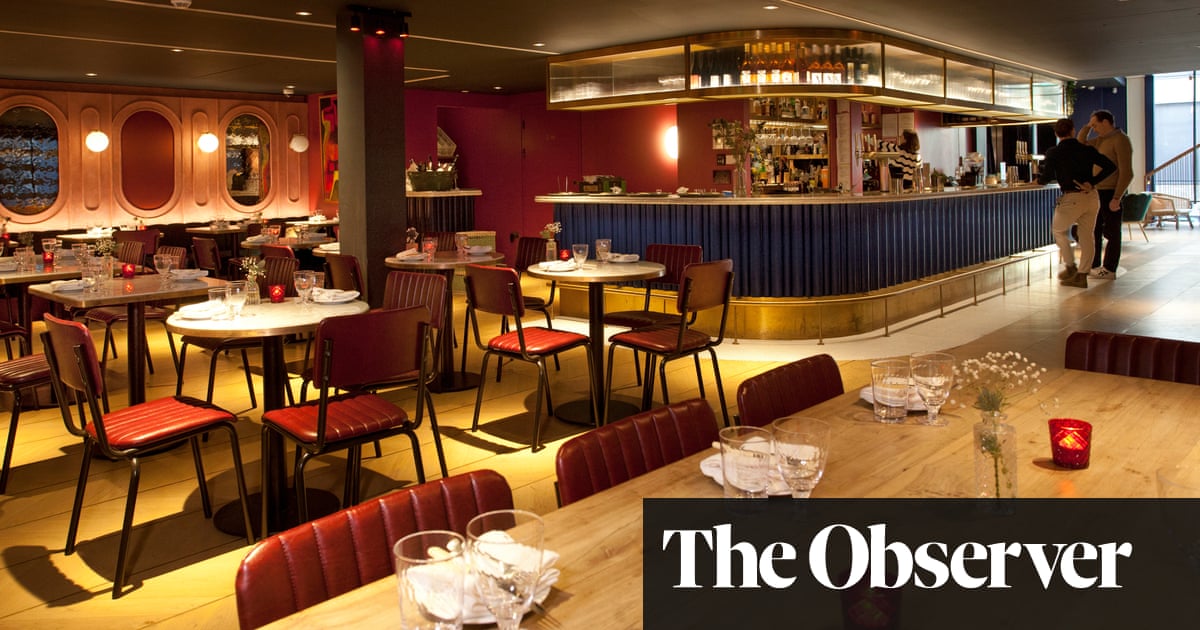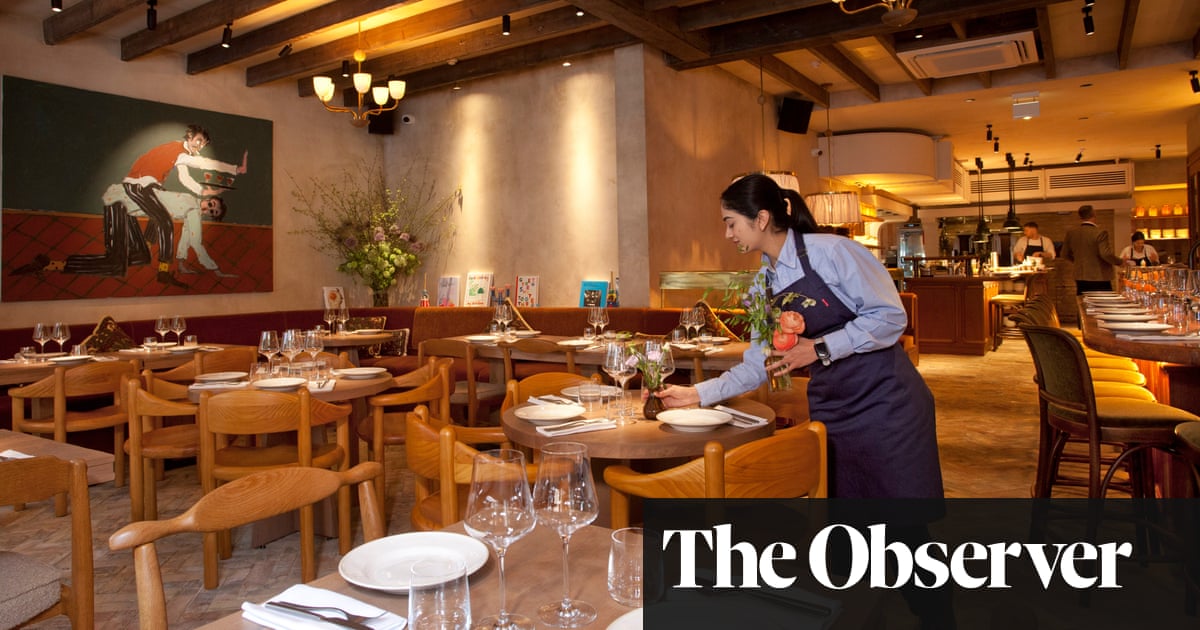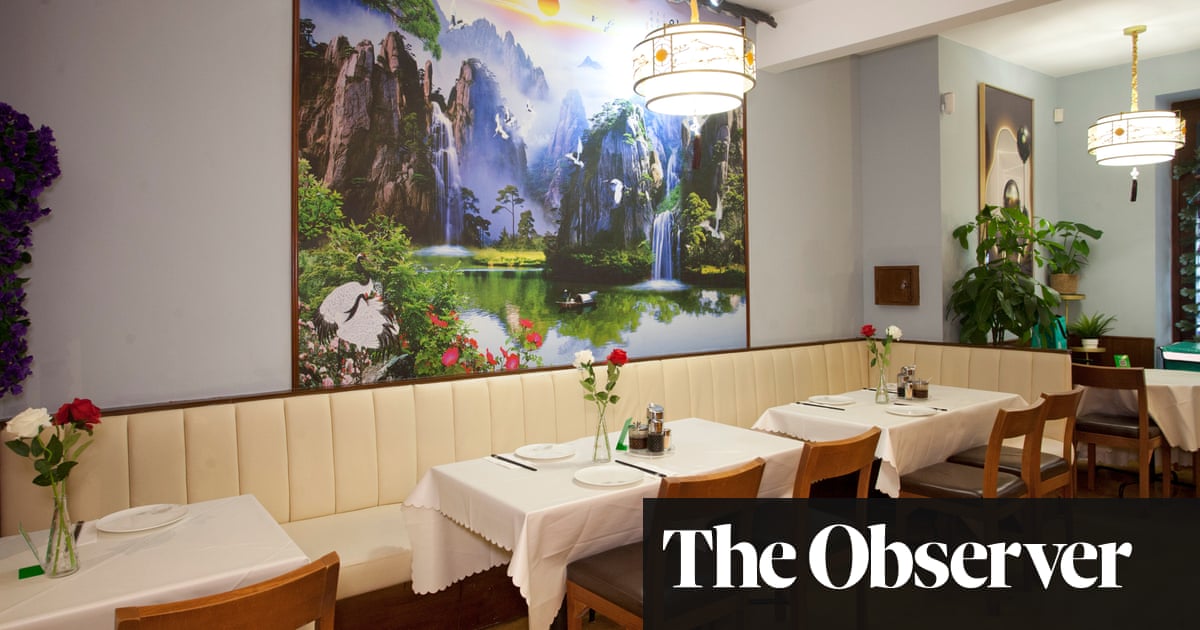
Isibani, 9 Knightsbridge Green, London SW1X 7QL. Small plates £9-£16, large plates £18-£31, desserts £14, wines from £28
Alhaji Suya, 15 Peckham Park Road, London SE15 6TR and Walworth and Greenwich
Experience teaches us that more expensive does not always mean better. Even so, sometimes these things must be tested. Which is why I’m sitting in a Zipcar on a Peckham sidestreet, with a foil takeaway container on my lap, trying not to make a mess. The foil box contains a fold of pink greaseproof paper, filled in turn with soft lozenges of thickly spice-dusted barbecue beef. In the warmth of the makeshift paper bag the dry spice mix has become soft. No worries. I have more in a transparent sachet. It’s the colour of ground rust. I throw it on liberally while trying not to get any on the seats. Zipcar-member etiquette is a minefield and I’m sure that spraying deep orange West African spice mixes all over the driver’s seat is a big no-no, even if in the service of culinary self-education.
I jab away at the beef with my little wooden fork. Gosh. It’s a joyously bold hit of chilli and garlic and smokiness, all underwritten by the sweetness of ground peanut. This is only the second time I have tried suya, the famed Nigerian way with smoked or barbecued beef, lamb and chicken. Other meats are available. I had always suspected it would be my kind of thing. I’m a sucker for the vivid interaction of meat, fire and spice, and was frankly baffled that I had not tried it. It was a gross omission on my part.
Now I’ve discovered I love it, which is a relief. Because the first time I tried suya just a couple of days ago, at the West African restaurant Isibani, in fancy Knightsbridge, I had been a picture of pouting, school kid disappointment. The skewered folds of beef served there had been dry and flavourless, unless introduced to the pile of spices sitting far to the side of a plate, like an overly exuberant party guest kept away from everyone else for fear they’ll disgrace themselves. I frowned at the plate in front of me. The fact is, I lacked reference points. The next day I asked Jimi Famurewa, restaurant critic of the London Evening Standard, whose family is Nigerian, to recommend somewhere for the good stuff. He sent me to Alhaji Suya, a small group of Nigerian takeaways across southeast London, where a sizable portion costs £8.99 as against the £12 at Isibani. Jimi knows what he’s talking about. Alhaji Suya is great.
That said, Isibani is mostly great, too, if you can forgive the suya, which some people simply won’t. But I can, on account of the pepper soup. Oh God, the pepper soup. Bathe me in the pepper soup. I’ll come back to that in a moment. Isibani, which opened last year down a tidy pedestrian cut-through beside the Bulgari Hotel, feels like a neighbourhood restaurant for a part of London that doesn’t have one. If you don’t count the masters of the universe living in the nearby chrome-clad apartment blocks protected from the world by layers of concierge, security and wealth-encrusted paranoia. Which I don’t. Still, there’s a profound warmth to this small, brightly lit dining room with its blue banquettes and marble floor and its waiters eager to help you navigate the unfamiliar.
It’s simply a very nice place to be. The chef is Victor Okunowo, previously of the Wolseley and the Chiltern Firehouse, who also competed a couple of years back on MasterChef: the Professionals. He and his partners, Anthony Douglas Chuka and Abdul Malik Abubakar, describe the menu as a “love letter” to the West African food they grew up on. When it was first announced, the menu descriptions suggested they were determined to do some fancy, evolved version of West African classics; the sort of thing that might be perceived to bellow “Knightsbridge”. But praise be, there’s now far less of the evolution. It’s just the bangers.
Which brings me to the main-course pepper soup, and the love letter I now wish to write to it. Oh my darling, come to me. Feed me. Make me whole. The name of the dish does the job. It really is a peppery pepper soup, the colour of the best brown foods, with an unrepentantly fiery hit. It grabs you by the collar, drags you in and shakes you about a bit. Laid across the bowl, as if happily beached, is a chargrilled croaker, a white-fleshed, meaty fish. That flesh tumbles from the bone and deep into the depths, so you can, well, fish it out again. It’s a profoundly comforting, utterly compelling bowl of savoury joy. I would come back here just for this, and not quite twitch at the £25 price tag. What were you expecting? That’s the bloody Bulgari Hotel over there.
There are other very good things, too. Deep marinated, then grilled baby chicken yassa is sensitively cooked, with a lovely rich char, and comes with a forceful relish. There’s also a diverting jollof rice. In her brilliant cookbook Africana, the Nigerian-born food writer Lerato Umah-Shaylor writes vividly about the culture wars, especially between Nigeria and Ghana, over who makes the best jollof. Honestly, I’m not getting involved. It’s clear the base of tomatoes, onions and scotch bonnets are only the beginning. As Lerato says, it is a dish that demands practice. The very good jollof from Alhaji Suya in Peckham felt like a cosy domestic version; the kind of dish with which a parent welcomes home a child. The Isibani version is smokier and more aromatic.
There is a great dessert dish of puff puff, those crisp-shelled, golden, deep-fried dough balls served with a sweet caramel sauce. Only it actually came with the starters. It is a cultural thing that those rooted to a savoury-sweet order of dishes can find hard to get their head around, even though that’s pretty arbitrary. I wanted to try the plantain tatin, but that was off. So instead, it was cheesecake and a very light sticky toffee pudding. I suspect you can get a lot of cheesecake and sticky toffee pudding in this corner of Knightsbridge. But they were great, so really I’m not complaining. Apart from about the suya. That, I am fussing over. Still, in the Knightsbridge of stupidly expensive wagyu burgers, and next-level sushi dressed with a psoriasis of caviar, and that ludicrous Salt Bae bloke across the road doing unpleasant things with cow and gold leaf, Isibani is a tiny joy. It feeds and it cares. I’ll take that.
News bites
Chef-restaurateur Terry Laybourne, a stalwart of the hospitality business in and around Newcastle and the northeast for decades, has reopened his Franco-Italian wine bar St Vincent after a three-year break. It closed with the first Covid lockdown in March of 2020 and while the rest of his businesses (and a new restaurant in York) began trading again, it stayed shuttered. The wine list will focus on small producers and will include a changing list of open bottles by the glass, alongside the now familiar menu of small and larger plates (stvincentnewcastle.co.uk).
The spread of food halls across the UK continues with the announcement that the redevelopment of the former Queensgate Market building in Huddersfield, will include one. As well as a library and an event space, there will be room for ten independent traders around a communal seating area. Work will begin early next year, with completion by 2026.
The Smoking Lobster group of seafood restaurants on the Isle of Wight, which already has outlets in Ventnor and Cowes as well as an events group, is to launch a new venture inside the recently renamed Foresters Hall hotel (formerly North House) in the heart of Cowes Old Town. The Brasserie by Smoking Lobster will open on 7 April and will have 80 covers plus a 15-seat private dining room. Some of the seafood will come from the restaurant’s own fishing boat which will go out five days a week (forestershall.com).












